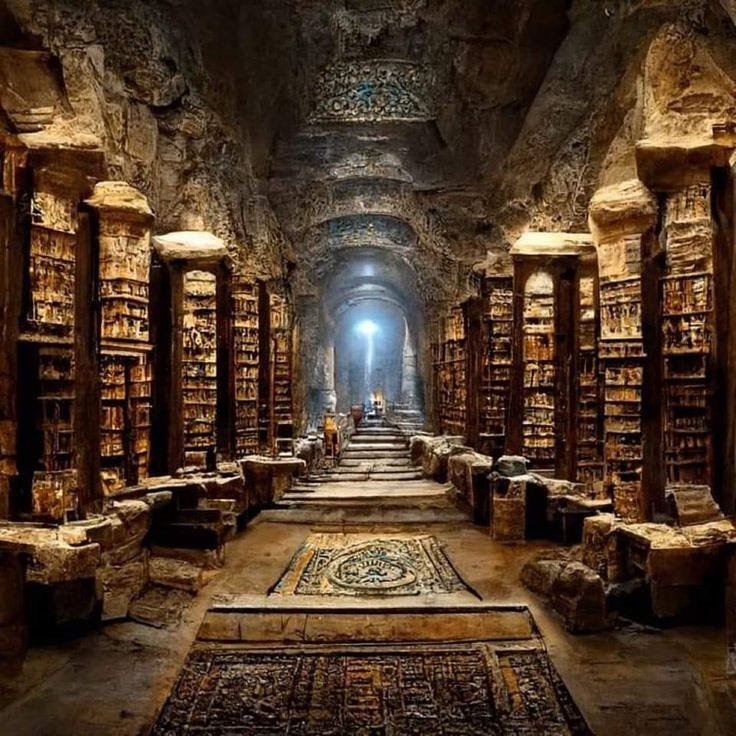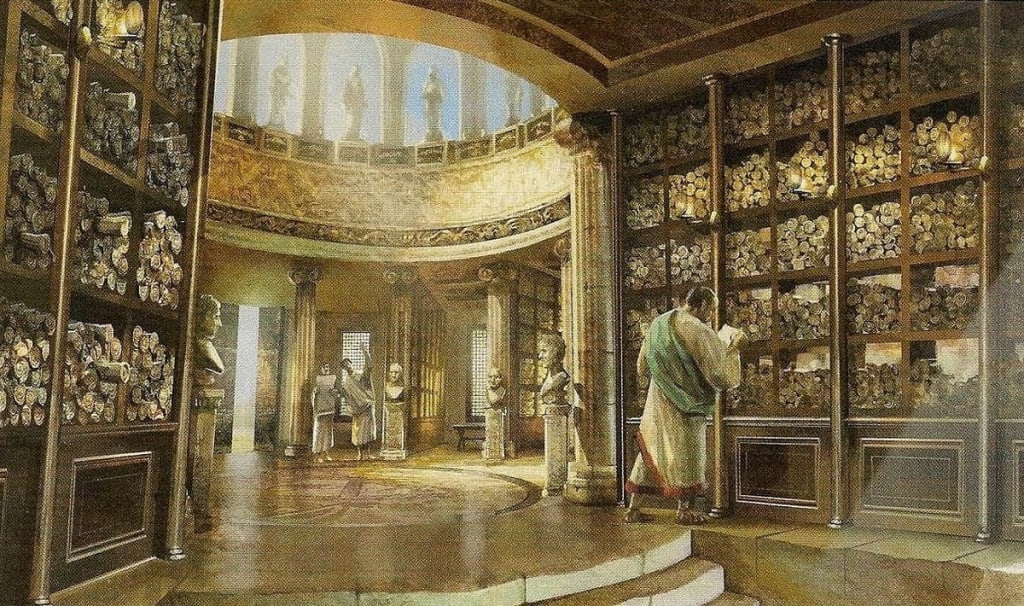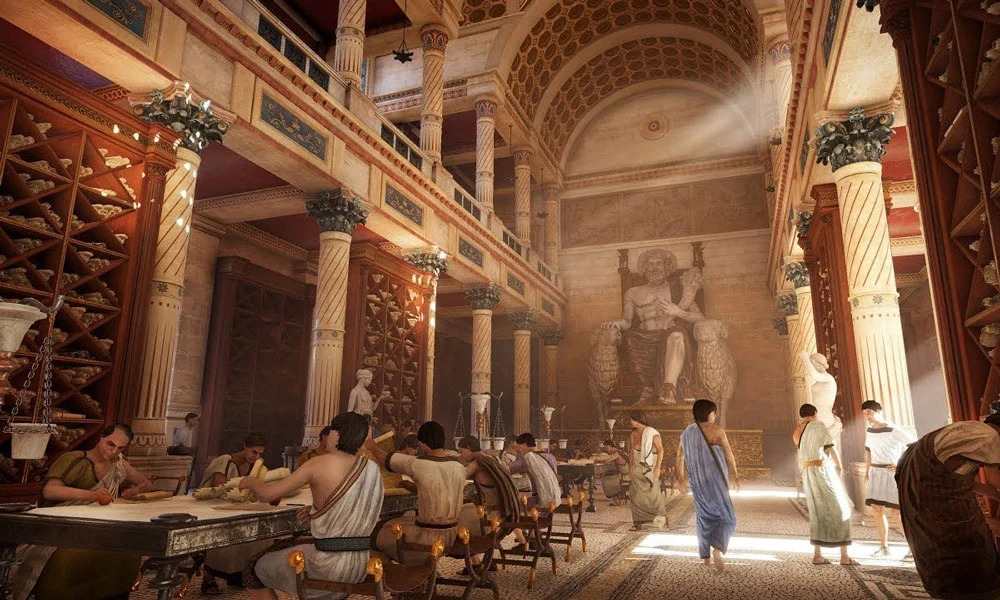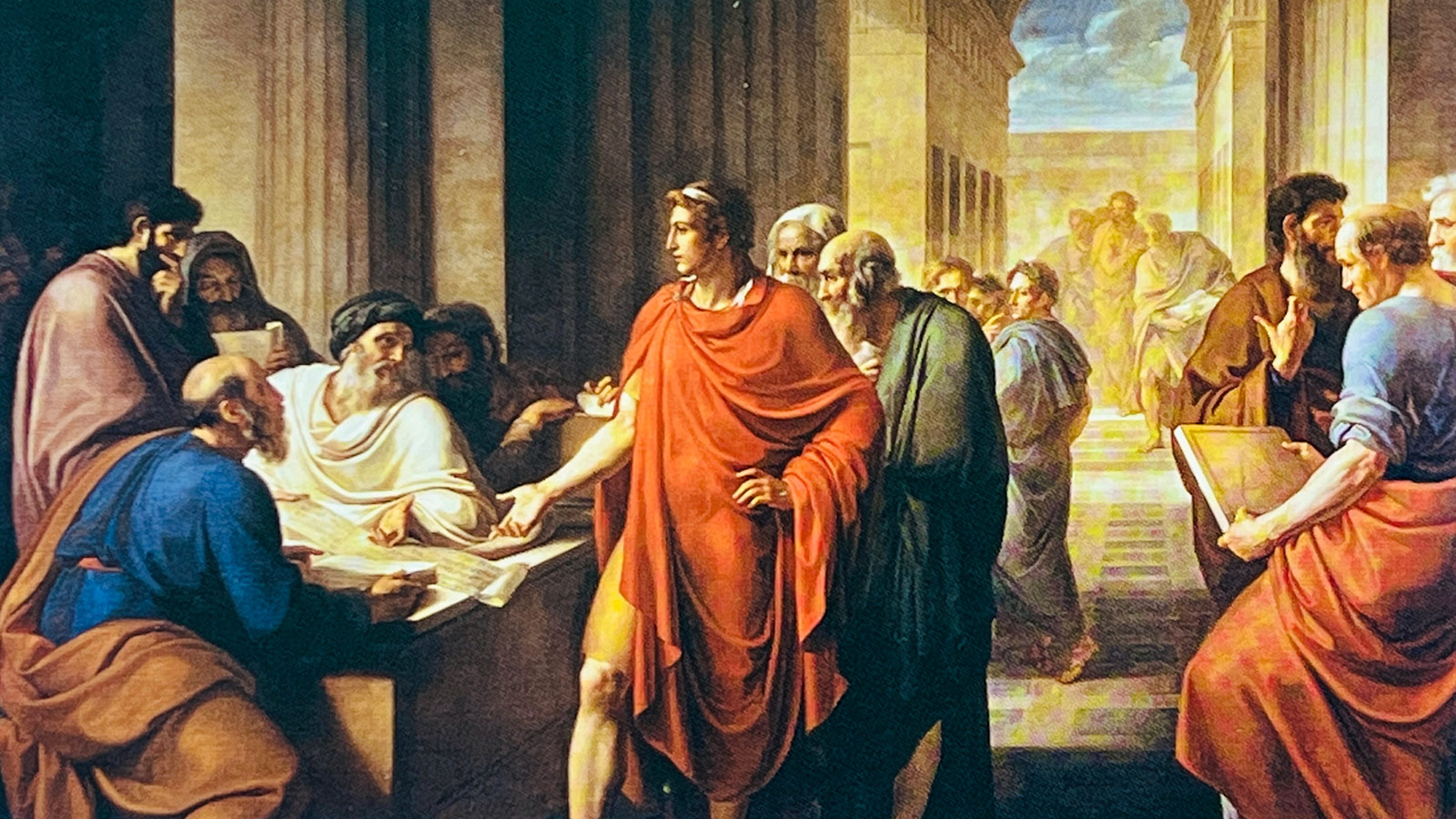The Library of Alexandria stands as one of the most legendary centers of learning in the ancient world, epitomizing the quest for knowledge and the dissemination of scientific thought. Founded in the 3rd century BCE in Alexandria, Egypt, it became a hub for scholars, philosophers, and thinkers from diverse backgrounds, amassing a vast collection of texts and manuscripts that spanned numerous fields. Despite its eventual destruction, the library's influence on future generations and modern scholarship remains profound. This blog post delves into the history, significance, and enduring legacy of the Library of Alexandria, exploring the scholars who thrived within its walls and the impact of its loss on the quest for knowledge through the ages.
The History of the Library of Alexandria
The Library of Alexandria, established in the early 3rd century BCE in the city of Alexandria, Egypt, was not merely a collection of books but rather a beacon of intellectual advancement and a hub of scientific inquiry, signifying one of the most profound efforts in antiquity to gather and protect the knowledge of the world as it was then known. Established during the reign of Ptolemy I Soter, who sought to create a place where scholars from various regions could gather to study, the library became the heart of the larger institution known as the Museum of Alexandria, which comprised both a library and a botanical garden, making it a unique marvel of the ancient world that fostered not only the preservation but also the stimulation of knowledge across multiple disciplines. The ambition behind the Library of Alexandria was encapsulated in its aim to compile all existing knowledge, and to this end, the Ptolemaic kings actively pursued the acquisition of texts, encouraging scholars and scribes to contribute their works and translating texts into Greek from languages such as Egyptian, Persian, Hebrew, and many others. The library is believed to have held hundreds of thousands of scrolls at its height, ranging from literature and philosophy to mathematics and science, and it became a vital center for the study of various subjects, hosting famous scholars like Euclid and Archimedes, who contributed significantly to mathematics and physics while utilizing the rich resources at their disposal. The legacy of the Library of Alexandria is often seen as a dual-edged sword; while the library itself endured numerous challenges over the centuries due to political upheaval and wars that destabilized the region, it also served as a model for future libraries, inspiring the concept of centralized knowledge hubs across centuries and cultures. Today, the idea of a library has evolved, and the aspirations that fueled the creation of the Library of Alexandria continue to reverberate in modern educational and research endeavors, underscoring the enduring significance of places dedicated to the pursuit of knowledge. As we reflect on its history, one cannot overlook the profound impact that this ancient library had on the preservation of knowledge and its remarkable influence on subsequent generations of thinkers and the libraries that would follow, often highlighted in various historical analyses and philosophical discourses that celebrate the quest for learning and understanding.
- Established in the early 3rd century BCE in Alexandria, Egypt.
- Home to perhaps hundreds of thousands of scrolls during its peak.
- Attracted renowned scholars including Euclid and Archimedes.
- Sought to collect and translate texts from various cultures.
- Inspired future libraries and educational institutions globally.
The story of the Library of Alexandria serves as a reminder of the fragility of knowledge and the importance of intellectual endeavors, and though the library itself eventually faced decline and destruction, its ideals lived on, encouraging later civilizations to aspire to similar ambitions in their pursuits of knowledge, scholarship, and learning. The fascination with what the library represented, both in terms of its material collection and its philosophical contributions, continues to inspire scholars, researchers, and book lovers alike, resonating through the corridors of history and echoing in the values that libraries promote to this day. The legacy of the Library of Alexandria, with its rich history of knowledge accumulation, serves as an enduring testament to the human spirit's relentless quest for understanding, setting a benchmark for what libraries could and should aim to achieve in the cultural landscape of humanity.

The Founding and Growth of the Library
The origins of the Library of Alexandria, often regarded as one of the most significant achievements of the ancient world, can be traced back to the early 3rd century BCE during the reign of Ptolemy I Soter, who was a general under Alexander the Great and later became the first ruler of the Ptolemaic Kingdom of Egypt, showcasing his ambition not only to conquer but also to cultivate a flourishing center of knowledge that would attract scholars and thinkers from across the Mediterranean.
Established as part of a larger institution known as the Mouseion, which paid homage to the Muses and aimed to serve as a cultural and educational haven, the Library of Alexandria evolved into a prominent hub for learning, research, and philosophical discourse, fostering a vibrant intellectual atmosphere that was unlike any other civilization of its time.
The growth of the library was met with remarkable dedication, as Ptolemy I initiated an extensive campaign to amass a vast collection of texts, striving to gather works from across various cultures and languages, which subsequently transformed the library into the most significant repository of knowledge in the ancient world, as it is believed to have housed hundreds of thousands of scrolls comprising works in philosophy, mathematics, astronomy, medicine, and literature.
| Key Figures | Role in the Library |
|---|---|
| Ptolemy I Soter | Founder and Patron |
| Demetrius of Phalerum | First librarian and organizer |
| Euclid | Mathematician, contributed to mathematical texts |
The allure of the Library of Alexandria was not only attributed to the vast collection of scrolls, as it also became a gathering place for some of the greatest minds of the time, whose curiosity was fueled by the opportunity to engage with profound knowledge and contribute their insights, which led to advancements in various fields such as geometry, astronomy, and ethics.
Throughout the years, the Library attracted renowned scholars such as Eratosthenes, who calculated the Earth's circumference, and Aristarchus, who proposed the heliocentric theory, reinforcing the library’s status as a beacon of scientific inquiry and intellectual exploration, drawing in legions of ambitious thinkers eager to exchange ideas and expand their understanding of the universe.
As the Ptolemaic dynasty continued to flourish, the library underwent numerous expansions and renovations, eventually becoming a monumental institution that not only preserved the knowledge of previous civilizations but also fostered an environment where innovation and new philosophies could be nurtured, forever solidifying its legacy as a pillar of intellectual achievement.
- Establishment during Ptolemy I's reign.
- Formation of the Mouseion as a central institution.
- Aggressive collection of texts from various cultures.
- Attraction of scholars from different fields of study.
- Continued growth and renovations throughout the Ptolemaic period.
In summary, the Library of Alexandria's founding and growth encapsulate a remarkable chapter in the annals of history, revealing how a bold vision underpinned by a relentless pursuit of knowledge led to an unparalleled legacy that still ignites the imaginations of scholars and book lovers alike, affirming the importance of the library as a crucial location of intellectual advancement and cultural exchange.

The Collection of Ancient Texts and Manuscripts
The Library of Alexandria, renowned for being one of the greatest repositories of knowledge in the ancient world, boasted a remarkable collection of texts and manuscripts that spanned a wide range of disciplines, including philosophy, mathematics, astronomy, medicine, and literature, and this voluminous archive was pivotal in the preservation and dissemination of knowledge across generations. With scholars from various regions congregating at its halls, the library not only attracted the works of illustrious authors and thinkers but also served as a critical hub for the collating and translating of texts, which ensured that a remarkable array of human thought was documented and preserved for posterity. The sheer diversity of the collection included texts by the likes of Homer, Plato, and Aristotle, among many others who influenced various fields of study, all of which contributed to the library's reputation as a beacon of enlightenment and intellectual pursuit in the ancient world. One cannot fully appreciate the scope and importance of the library’s collections without considering the methodologies employed by its dedicated scholars, who meticulously gathered manuscripts from across the known world, capturing not only the works of renowned philosophers but also lesser-known texts from different cultures that enriched the human experience. This concerted effort to acquire and preserve knowledge culminated in a collection that is said to have housed hundreds of thousands of scrolls, each meticulously transcribed and cataloged to ensure that no fragment of wisdom would be lost even as civilizations rose and fell. In this pursuit of knowledge, the library became an assurance that humanity’s intellectual heritage would not be relegated to obscurity, but rather celebrated and studied for centuries to come. The significance of the Library of Alexandria's collection can be encapsulated in a few noteworthy aspects:
- Diversity of Sources: The library accumulated texts from a multitude of cultures, enriching world knowledge.
- Translation Efforts: Scholars translated critical works into Greek, further disseminating knowledge across regions and languages.
- Preservation Techniques: Innovative storage and cataloging methods were developed to ensure the longevity of the texts.
The legacy of the Library of Alexandria and its extraordinary collection of ancient texts and manuscripts serves as a reminder of the importance of preserving our intellectual heritage, a mission that resonates strongly even in today’s digital age where the preservation of knowledge continues to evolve. As we reflect upon the monumental impact that this library had on the study and appreciation of scholarly work, we must recognize that its collection not only informed the intellectual pursuits of its time but also laid the groundwork for future libraries, inspiring generations of scholars to cherish and seek knowledge in all its forms. Ultimately, the treasures housed within the library remind us of our responsibility to safeguard the written word, ensuring that it remains accessible and respected as a vital part of our collective history.
The Scholars and Philosophers Who Studied at the Library
The Library of Alexandria, often regarded as the central hub of knowledge during the ancient world, was not merely a repository of countless scrolls and manuscripts, but a vibrant center where some of the greatest intellects of the time gathered to share ideas, conduct research, and contribute to the vast body of human knowledge; among its illustrious scholars were figures such as Euclid, whose geometric principles still underlie modern mathematics, and Archimedes, the great inventor and mathematician known for his advancements in the understanding of buoyancy and leverage.
Another significant scholar associated with the Library was Eratosthenes, who held the chief librarian position and was renowned for his remarkable work in geography, particularly his calculation of the Earth's circumference, which showcased not only his mathematical prowess but also his innovative approach to collecting and interpreting data, thereby establishing a foundational principle in the scientific methodology that continues to influence researchers today.
The presence of these great minds created a fertile intellectual environment that fostered discourse across various disciplines, allowing philosophers like Philo of Alexandria to blend Greek philosophical thought with Jewish theology, consequently enriching both spheres of study and demonstrating the Library's role in bridging diverse cultures and ideas.
| Scholar/Philosopher | Contributions |
|---|---|
| Euclid | Developed foundational principles of geometry. |
| Archimedes | Advanced understanding of physics and engineering. |
| Eratosthenes | Calculated the Earth's circumference and contributed to geography. |
| Philo of Alexandria | Integrated Greek philosophy with Jewish thought. |
In addition to the notable figures mentioned, the library also attracted numerous mathematicians, astronomers, and writers whose collective works further solidified Alexandria’s status as a beacon of intellect; for instance, the astronomer Hipparchus, who laid the groundwork for modern astronomy through his star catalog and systems of celestial mechanics, became a prominent figure within the library's ecosystem of knowledge.
Moreover, the contributions of medical scholars such as Herophilus and Erasistratus were not to be overlooked, as they made significant strides in the understanding of human anatomy and medicine, conducting vital dissections and observations that would influence medical practices for centuries, vividly exemplifying the library's role as a transformative space for pioneering thought.
- Euclid's Elements was pivotal in establishing geometry as a discipline.
- Archimedes invented many improved machines and tools that showcased his theories about physics.
- Eratosthenes not only made geographical discoveries but also was instrumental in the early library's organizational methods.
- Philo’s works initiated the fusion of stoicism and Judaic thought.
- Herophilus and Erasistratus radically transformed the field of medicine with their anatomical studies.
Through the collective efforts of these scholars and philosophers, the Library of Alexandria cultivated an unprecedented level of inquiry and discovery that not only advanced the fields they specialized in but also laid foundational cornerstones for future scholars, ensuring that the spirit of curiosity and the quest for knowledge continued to resonate throughout the ages; thus, it becomes imperative to recognize the lasting impact of these individuals whose intellectual legacies still inform contemporary thought and scholarship today.

The Destruction and Legacy of the Library
The Library of Alexandria, once regarded as the largest and most significant library of the ancient world, witnessed a series of catastrophic events that ultimately led to its downfall, leaving behind not only a tremendous sense of loss over the knowledge that was irretrievably lost but also an enduring legacy that continues to captivate scholars and historians to this day.
The destruction of this magnificent institution is often attributed to several key events throughout its existence, including the civil wars in Alexandria, military sieges, and, importantly, the decree of Emperor Aurelian in the 3rd century A.D., which led to significant damage to the city and the library itself, effectively diminishing its status as a vibrant center of learning.
Moreover, while the exact timeline of the library's destruction remains shrouded in historical ambiguity, it is widely accepted that numerous contributing factors played a role in its decline, not the least of which were the transitions in power and the changing cultural landscapes of the time, which often devalued the importance of such repositories of knowledge.
| Event | Date | Description |
|---|---|---|
| Civil Wars | 1st Century B.C. | Internal conflicts led to significant disruptions in Alexandria. |
| Siege by Julius Caesar | 48 B.C. | Fire caused by the Romans during the siege consumed parts of the library. |
| Decree of Aurelian | 270 A.D. | Military actions that resulted in serious damage to the library. |
As the dust settled over the ruins of what was once a monumental symbol of wisdom and oratory, the legacy of the Library of Alexandria began to evolve beyond its physical presence, inspiring future generations and paving the way for the establishment of libraries across the world, which aimed to encapsulate the essence of knowledge and innovation that the ancient library represented.
The reverberations of its loss can be felt in the values held by modern institutions of learning, where the pursuit of knowledge and the conservation of ancient texts serve not only as a tribute to the past but also as a foundation upon which contemporary scholarship is built, exemplifying the importance of collecting, preserving, and disseminating information in the ongoing quest for enlightenment.
In essence, the legacy of the Library of Alexandria can be chronicled through various aspects that emphasize its enduring significance, particularly in the realms of culture, knowledge preservation, and scholarly exchange, which collectively contributed to shaping our understanding of the importance of libraries in society.
- The inspiration for the establishment of modern libraries.
- The promotion of intellectual inquiry and cultural discussions.
- The establishment of collective memory through the preservation of texts.
- The encouragement of educational systems prioritizing access to knowledge.
- The foundational role it played in the development of encyclopedic texts.
Ultimately, the legacy left by the Library of Alexandria serves not only as a reminder of what was lost but also as a beacon illuminating the path towards future endeavors in accumulating and sharing knowledge, reinforcing the idea that the fight for enlightenment is an ongoing journey that transcends the boundaries of time and space.

The Influence of the Library on Future Libraries
The Library of Alexandria, often regarded as one of the most significant libraries of the ancient world, played an indispensable role not only in the preservation and dissemination of knowledge during its time but also in shaping the very framework of libraries that would emerge in the centuries and millennia to follow, as its commitment to assembling the world's most treasured texts and fostering an environment for scholarly discourse established principles that would serve as a cornerstone for future libraries around the globe. Its comprehensive approach, which encouraged the collection of diverse works in various disciplines, highlighted the importance of much more than merely hoarding texts; it emphasized the active engagement of scholars and philosophers within its walls, fostering innovative thought and collaborative inquiry in ways that resonate within modern library systems. In many respects, the Library of Alexandria exemplified the aspiration towards the universal collection of knowledge, an ambition that laid the groundwork for libraries that sought to amalgamate vast bodies of information, leading to the establishment of institutions dedicated to not only preserving historical sources but also making knowledge accessible to a wider audience. As subsequent libraries began to emerge in different cultures and regions, they borrowed from the Alexandria model, adapting its concepts of organization, academic freedom, and community engagement to suit their unique societal contexts, thus echoing the library's ethos in myriad forms throughout history. To illustrate this influence further, consider the following significant contributions from the Library of Alexandria that have persisted in shaping modern libraries:
- Curatorial methods: The Library set the precedent for collecting, categorizing, and preserving texts, a practice still fundamental in librarianship today.
- Accessibility of knowledge: The Library promoted the idea that knowledge should be made available to scholars and the public alike, a principle that drives many contemporary library initiatives.
- Interdisciplinarity: By featuring works from various fields like philosophy, science, and literature, the Library set an early example for the importance of interdisciplinary studies, inspiring future libraries to promote cross-disciplinary collaborations.
In addition to these foundational concepts, the organizational structure implemented within the Library of Alexandria—complete with inventories and catalogs—foreshadowed modern cataloging practices that are now vital components of library systems. From the meticulous classification of texts to the creation of systems for organizing books based on subject matter, the seeds of modern librarianship were undoubtedly planted in the fertile grounds of this ancient institution. As we consider the struggles faced by libraries in more recent history, including tensions related to censorship and the selective preservation of narratives, it becomes clear that the challenges confronted by the Library of Alexandria have been echoed throughout time, leading to an ongoing dialogue about the role of libraries as custodians of knowledge. Modern libraries continue to rely on the principles established by the Library of Alexandria, navigating the delicate balance between curating collections and advocating for information access. Consequently, the enduring legacy of the Library of Alexandria is not merely a reflection of its historical significance; rather, it is an ongoing conversation between the past and present, providing contemporary libraries with a rich tapestry from which to learn and evolve. The corollary of this historical influence is that the ideals championed by the Library of Alexandria remain crucial in today's rapidly changing information landscape, urging us to remember that, at their best, libraries are not just repositories of books but vibrant community spaces that inspire, educate, and empower individuals to engage with knowledge in meaningful ways.
The Rediscovery and Archaeological Excavations of the Library
The journey towards rediscovering the Library of Alexandria, which was once one of the greatest centers of learning and knowledge in the ancient world, has been a tale woven with intrigue, scholarly pursuit, and the relentless quest for historical truth, resounding through the echoes of time as archaeologists and historians alike have endeavored to piece together the fragments of this monumental institution that housed invaluable texts and attracted the brightest minds of antiquity. Although the exact location of the library remained a mystery for centuries, several theories emerged, propelled by the accounts of ancient scholars and tales of great scholars such as Eratosthenes and Callimachus, who had once walked the hallowed halls, sharing and expanding knowledge that was, unfortunately, lost to history. The persistent efforts by researchers and explorers in the modern era have gradually begun to unveil the secrets of the Library of Alexandria, prompting both excitement and skepticism in the academic community as excavation sites are analyzed and ancient texts are re-evaluated.
Archaeological Discoveries
The significant breakthroughs in the rediscovery of the Library of Alexandria can be attributed to various archaeological discoveries made along the Egyptian coastline, where researchers have diligently sifted through the remnants of ancient structures that date back to the city's flourishing period. Major excavation sites, such as those located in the ancient district of Rhakotis, have unveiled numerous artifacts, and it is believed that some of these artifacts may even be remnants of the library itself, thus sparking new interest in the potential preservation of ancient texts. Among the most notable artifacts discovered are large terracotta storage jars that may have been used to transport manuscripts, pointing towards Alexandria’s role not only as a hub of knowledge but also as a significant center for the distribution of texts across the Mediterranean.

The Impact of Excavations
Each new finding generates a wave of enthusiasm among historians and archaeologists who tirelessly seek to piece together not only the structure and layout of the library, but also its comprehensive collection of texts, which is said to have included works from various disciplines, such as mathematics, philosophy, and science. Furthermore, the ongoing excavations have allowed the academic community to engage in dialogues regarding the importance of preservation, challenging modern society to recognize the value of safeguarding our historical heritage, lest we replicate the tragic loss experienced with the destruction of the library in antiquity. The unearthing of potential texts and manuscripts from excavation sites has also enabled scholars to refine their understanding of the literary and scholarly traditions of the ancient world, ultimately reaffirming the library's prominence in the annals of history.
- Excavated artifacts hinting at ancient manuscript transport.
- Evidence supporting Alexandria's role in text distribution.
- Significant unearthing of educational and scholarly artifacts.
- Continued dialogue on historical preservation practices.
- Influence on contemporary understanding of ancient knowledge.
The Modern-Day Significance of the Library of Alexandria
In our contemporary world, the legacy of the Library of Alexandria continues to resonate profoundly as a historic milestone in the journey of knowledge and scholarship, illustrating how the pursuit of learning transcends temporal and cultural boundaries even in today's digital age where information is at our fingertips. The ideals and aspirations embodied by this ancient institution serve as a reminder of our collective responsibility to preserve, share, and expand upon the vast reservoirs of human knowledge that have been meticulously compiled over centuries. As we navigate through the complexities of modernity, the significance of the Library of Alexandria manifests not only in the historical narratives that inform our understanding of the past but also as a source of inspiration for the continuous evolution of libraries around the globe.
In the age of information technology, the Library of Alexandria stands as a pivotal symbol for modern libraries, which strive to replicate its commitment to making knowledge accessible to all. Its original mission of collecting, preserving, and disseminating texts is mirrored in today's institutions, which are increasingly turning to modern technologies to enhance their service to communities and foster a culture of inquiry and intellectual exchange. Emphasizing the spirit of collaboration, modern libraries are breaking away from traditional paradigms and are now evolving into collaborative spaces that promote inclusivity while providing diverse resources and educational opportunities for individuals from all walks of life.
- Preservation of Knowledge: Modern libraries function as guardians of knowledge, committed to preserving both physical and digital texts for future generations.
- Access to Information: Equally as important is the library's role in facilitating access to information, thereby strengthening the foundation of democracy and informed citizenship.
- Community Engagement: By providing resources and programming, libraries engage communities and cultivate a love for reading, learning, and intellectual exploration.
With advancements in technology, modern libraries are embracing digital transformation, which echoes the pioneering spirit of the Library of Alexandria that once housed a wealth of knowledge. Digital archiving initiatives, online databases, and global access to information illustrate how the library has adapted to meet the needs of contemporary society while maintaining the core values of education and enlightenment. Furthermore, the proliferation of digital literacy programs is crucial as they equip individuals with the skills needed to navigate the boundless expanse of information available today, much like the scholars of ancient times who sought to unravel the mysteries of their world from the vast collection housed within the Library of Alexandria.
The significance of the Library of Alexandria is also reflected in the numerous commemorative and educational initiatives that have emerged globally, aimed at rekindling the flame of knowledge and reflection instilled by this great institution. Initiatives such as the Bibliotheca Alexandrina in modern-day Alexandria seek to pay homage to their ancient predecessor by creating a state-of-the-art center that fosters learning, cultural exchange, and dialogue among scholars, practitioners, and the public. This illustrates not only a reverence for history but also a commitment to forging pathways that allow diverse voices and perspectives to converge, thus enriching the tapestry of human knowledge.
In conclusion, the modern-day significance of the Library of Alexandria is firmly rooted in its embodiment of the quest for knowledge and understanding, inspiring libraries to function as beacons of learning and community engagement. As we continue to navigate the challenges and opportunities of the information age, it is imperative that we uphold the principles established by the Library of Alexandria, championing the preservation of knowledge while fostering an inclusive environment for the exchange of ideas and the cultivation of intellectual curiosity. Ultimately, the legacy of the Library of Alexandria serves not only as a reflection of our past but also as a guiding principle for the future of libraries and the pursuit of knowledge in an ever-changing world.
Frequently Asked Questions
What was the Library of Alexandria?
The Library of Alexandria was an ancient center of learning located in Alexandria, Egypt, founded in the 3rd century BCE, renowned for its vast collection of scrolls and texts.
Why was the Library of Alexandria significant?
It was significant because it symbolized the pursuit of knowledge and intellectual achievement in the ancient world, attracting scholars from various regions and fostering advancements in multiple fields of study.
Who founded the Library of Alexandria?
The Library of Alexandria was established by Ptolemy I Soter, a successor of Alexander the Great, in an effort to gather the knowledge of the world.
What type of works were housed in the Library of Alexandria?
The library housed a vast collection of texts on various subjects, including literature, mathematics, astronomy, medicine, and philosophy, making it one of the most comprehensive libraries of the ancient world.
How did the Library of Alexandria contribute to science?
The library played a crucial role in the advancement of science by providing a place for scholars to collaborate, share ideas, and conduct research, leading to significant discoveries and innovations.
What led to the decline of the Library of Alexandria?
The decline was due to a series of events including fires, invasions, and political turmoil that led to the gradual loss of the library's collection and its eventual destruction.
What is the legacy of the Library of Alexandria today?
The legacy of the Library of Alexandria endures as a symbol of knowledge and intellectual inquiry, inspiring modern libraries and institutions dedicated to preserving and disseminating knowledge.

